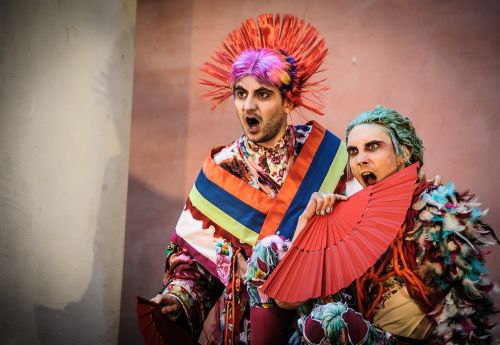 Sweden Benjamin Britten: A Midsummer Night’s Dream Soloists, Läckö Chamber Orchestra, Simon Phipps (conductor), Läckö Slottsopera, Läckö Castle, 13.07.2013 (NS)
Sweden Benjamin Britten: A Midsummer Night’s Dream Soloists, Läckö Chamber Orchestra, Simon Phipps (conductor), Läckö Slottsopera, Läckö Castle, 13.07.2013 (NS)
Cast:
Oberon, King of the Fairies (also Theseus): Daniel Carlsson
Titania, Queen of the Fairies (also Hippolyta): Sofie Asplund
Puck: Michael Jonsson
Fairies: Julia Borg, Erika Broberg, Agnes Duvander, Amanda Karlsson, Linnéa Keihag, Matilda Lifvergren, Rebecka Wallroth
Helena, in love with Demetrius: Sanna Gibbs
Hermia, in love with Lysander: Josefine Andersson
Lysander, in love with Hermia: Martin Vanberg
Demetrius, betrothed to Hermia: Jens Persson
Peter Quince, a carpenter: Lars Martinsson
Nick Bottom, a weaver: Jens Malmkvist
Francis Flute, a bellows-mender: Håkan Starkenberg
Tom Snout, a tinker: Jens Palmqvist
Robin Starveling, a tailor: Oscar Quiding
Snug, a joiner: Fredrik Samuelsson
Production:
Läckö Slottsopera
Direction: Åsa Melldahl
Choreography: Sara Larsson Fryxell
Costume design: Marcus Olson
Wigs and makeup: Angelica Ekeberg
Lighting: Markus Granqvist
Translation: Catarina Gnosspelius

Läckö has done it again. Given limited resources, a Britten opera and a beautiful outdoor setting they have again delivered an imaginative production with high musical standards. After having produced Britten’s chamber opera The Turn of the Screw two years ago (and Albert Herring before that) Läckö’s creative team have taken on his Midsummer Night’s Dream. Like last year’s production of The Cunning Little Vixen Britten’s opera evokes the natural world. Thanks to Marcus Olson’s wonderful costumes (with the fairies dressed in Sixties-inspired multi-coloured confections), Sara Larsson Fryxell’s elegant and naturalistic choreography and Åsa Melldahl’s astute direction this production was also wonderfully atmospheric and evocative of the dreamlike existence of Shakespeare’s characters.
Simon Phipps’ select ensemble (only the violin parts had more than one player) was of course not what Britten had scored but in the intimate acoustic of the castle courtyard they were perfectly balanced with the singers and brought out the playfulness of Britten’s score to the full. Mr Phipps showed yet again that he has a deep understanding of how to bring the best out of Britten’s music. One downside of the production was the near-total lack of a set: for most of the opera the one prop was a swivel chair. Last year Läckö created a very effective set with only a few props, but this was perhaps taking it a little far.
The cast of singers was impressive, with barely a weak link among them. Almost all of the singers had excellent articulation, meaning that Catarina Gnosspelius’ Swedish translation of the libretto was almost always fully intelligible. It was worth listening to the words, as Ms Gnosspelius has written a translation that bubbles with Shakespearean humour and innuendo.
It is difficult to pick any of the Athenians, but Martin Vanberg’s Lysander had a particularly expressive voice even when he was singing quietly. Helena (Sanna Gibbs) and Hermia (Josefine Andersson) created a sensational argument scene as they blamed each other for their respective men’s inexplicable changes of heart.

The one really responsible for the mess, Puck (an elfin Michael Jonsson), had a superb stage presence and moved like a dancer. The chorus of fairies also acted magnificently, flexibly switching from being a centre of attention to observing the blundering Athenians and Mechanicals with just the right amount of fascinated curiosity. They sang with ethereal beauty, complementing Titania and Oberon nicely.
Titania (Sofie Asplund) and Oberon (Daniel Carlsson) were two inspired choices. As a couple they were vocally well-matched and interacted wonderfully, both showing a streak of slightly juvenile petulance but also a mature willingness to forgive and forget. Having them reappear as Hippolyta and Theseus in the final scene was a very nice touch. They carried out their elegant choreography faultlessly, with Oberon a regal presence, almost a Sixties reincarnation of an Inca emperor. Ms Asplund’s shimmering voice soared as effortlessly as the swallows that joined us as non-paying guests in the castle courtyard. Her articulation allowed the audience to enjoy her lines, never more so than in her delightful seduction of Bottom. Mr Carlsson’s voice was a well-rounded and beautifully suggestive countertenor which projected well into the courtyard.
The Mechanicals worked very well together. Both in their singing and in their acting they worked well as an ensemble with astute comic timing. But their individual character traits were still allowed to show; Jens Malmkvist’s Bottom was a larger-than-life character, displaying commanding voice and ego that made his boast that he was made for the role of Hercules very believable. Flute (Håkan Starkenberg) was delightful in character as Flute and hilarious in drag as Thisbe. Snug (Fredrik Samuelsson) surprised everyone by his acrobatic dancing at the end of Pyramus and Thisbe. After the Mechanicals had packed up their theatre this magical evening drew to an end with exquisite orchestral playing and an enchanting chorus.